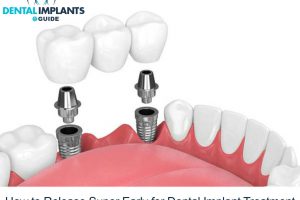How long do dental implants last?
How long do dental implants last?
The implant screw will last a lifetime with proper brushing and flossing, as long as the patient has routine dental checkups every six months. On the other hand, the crown typically only lasts 10 to 15 years before being replaced due to wear and tear. For more information, visit the best dental implants guide today!
High Quality Dental Implants Affordable Prices FREE Consultation


What can affect their lifespan?
If dental implants are well treated and cared for, they will last up to 30 years. Different causes, as with any dental procedure, will shorten the lifespan of a dental implant. These include:
- Oral health.
- Lifestyle choices.
- Injury or damage.
- Medical conditions.
Which teeth are replaced and where they sit in the mouth.
One or more of these factors will influence the longevity of dental implants and your overall oral health. Before beginning therapy, it’s a good idea to speak to the dentist about all of your choices and any current medical problems. They’ll be able to tell you whether or not dental implants are the best choice for you.
What Can You Do To Make Your Implants Last?
- Smoking. One of the most serious implant-related complications is this. It would help if you made an effort to stop smoking.
- Oral Hygiene is a term that refers to the cleanliness of one’s. It’s essential to pay close attention to your oral hygiene on a daily basis if you want your implant to last.
Here are a few pointers to get you started:
- Brush and floss the region around the teeth implants thoroughly.
- Use mouthwash to clean your teeth.
- Abrasive toothpaste, such as baking soda, can be avoided because it will melt the glaze from the implants.
Maintenance is needed regularly. It’s just as necessary to go to the dentist for routine checkups (recalls). You and your dental staff must determine how often these appointments can occur, although they are usually scheduled every 3 to 6 months. Your implants, hair, and gums are all tested and properly washed at these sessions, even places you can’t access at home. Washing implants professionally is more complicated than cleaning teeth, which means it takes longer and can necessitate specialised equipment.
How Dental Implants Help Your Jawbone Last?
When a tooth root is missing, the bone that was protecting it begins to deteriorate. This is known as bone resorption, and it can lead to a significant reduction in dental functions such as biting and chewing.
Furthermore, a missing tooth is unattractive. If bone loss is permitted to progress, as it does when an entire tooth is lost, it may result in facial collapse, loss of lip support, and the deepening of wrinkles across the jaw. When the chin and nose tend to tip inwards towards each other and come closer together, the nose may appear beaked.
One of the benefits of dental implants is that they can preserve bone by replacing missing tooth roots. Bone will develop a strong bond with implants, and when they osseointegrate, they will behave like a natural root. The implants have a solid foundation for regular, balanced chewing and biting. Implants activate the bone, allowing it to anchor the implants in place. This also restores facial features, improving self-confidence and overall quality of life.
Implants not only last a long time, but they also support the jaw and good looks last a long time!
(Discuss your dental situation with us)
Why are dental implants so durable?
Titanium is very heavy for its weight (it is more serious than other steels) and does not corrode. Titanium’s strength and longevity make it a good choice for preserving teeth, bridges, and dentures.
How Can Dental Implants Fail?
When adequately cared for, dental implants can provide a long-term substitute for lost or broken teeth. Still, several complications or circumstances can cause an implant to fail prematurely. Patients with diabetes or other pre-existing medical problems, such as cancer, are most likely to see their implant fail. Since the gums and adjacent teeth are also fragile, dental implants must be cared for daily, brushing and flossing. Gum disease can be caused by poor oral hygiene, which can compromise the effectiveness of a dental implant.
Reference
Michael S. Block, Dental Implants: The Last 100 Years, Journal of Oral and Maxillofacial Surgery, Volume 76, Issue 1, 2018, Pages 11-26, ISSN 0278-2391, https://doi.org/10.1016/j.joms.2017.08.045
Hancocks, S. How long will implants last?. Br Dent J 219, 243 (2015). https://doi.org/10.1038/sj.bdj.2015.726
Lemmerman, K.J. and Lemmerman, N.E. (2005), Osseointegrated Dental Implants in Private Practice: A Long‐Term Case Series Study. Journal of Periodontology, 76: 310-319. https://doi.org/10.1902/jop.2005.76.2.310









